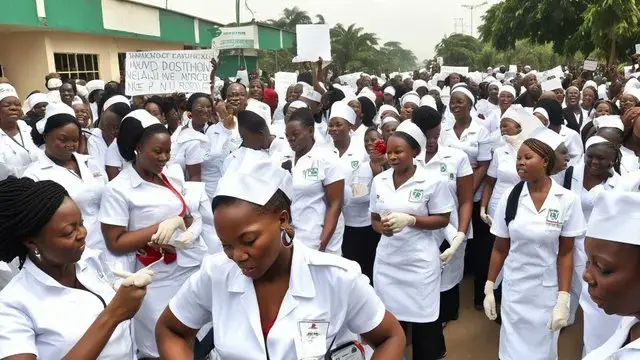Nurses in Abuja strike for better wages and conditions

Photo: Africanews
July 31, 2025 Hour: 3:11 pm
Nurses in Nigeria’s capital, Abuja, launched a seven-day warning strike on Wednesday, demanding overdue wage increases and improved working conditions. The walkout, announced by the National Association of Nigeria Nurses and Midwives (NANNM), has immediately strained an already fragile healthcare system. With inflation and daily expenses surging, the strike underscores deep frustrations within the public-health workforce.
Negotiations between NANNM and the federal government collapsed this week, prompting union leaders to withdraw services from major public hospitals. Tashikalma Halls, media adviser to the health minister, confirmed that officials invited nurse representatives to a meeting Wednesday evening but declined to disclose any proposed offers. The union neither confirmed nor denied plans to attend, leaving the outcome uncertain.
Across Abuja’s hospitals, administrators report critical staffing shortages as nurses abandon post. Outpatient clinics are overwhelmed, elective surgeries postponed, and emergency wards struggle to maintain basic care. Patients—especially the elderly, expectant mothers, and the chronically ill—now face longer wait times and heightened health risks.
This strike follows similar actions earlier in the year by health-clinic workers and primary-school teachers in the capital, both protesting sluggish wage adjustments from local councils. Those walkouts, though shorter, revealed a pattern of discontent among various tiers of Nigeria’s public-sector workforce. Each labor halt has chipped away at public confidence in government responsiveness.
In an effort to soften the blow of recent economic reforms, President Bola Tinubu raised the national minimum wage from 30,000 to 70,000 naira (roughly $20 to $45) per month. The measure won praise from the International Monetary Fund, but many Nigerians say it falls far short of offsetting soaring food, transportation, and fuel costs. For frontline health workers earning near that minimum, the pinch remains severe.
As the country grapples with high inflation, Abuja’s health system now buckles under the twin pressures of funding gaps and labor unrest. Hospitals chronically lack essential supplies—gloves, syringes, even basic medicines—exacerbating the challenges brought on by the strike. Budget constraints have left administrators scrambling to keep critical departments operational.
The nurses’ action lays bare the widening chasm between policy pronouncements and the daily realities of public employees. While government reforms tout macroeconomic stabilization, the brakes on salary growth leave workers unable to meet basic needs. This dynamic fuels a cycle of industrial actions that threaten service continuity.
On the ground, patients endure the most immediate fallout: prenatal check-ups delayed, imaging appointments rescheduled, and inpatient wards operating with minimal nursing staff. In some facilities, family members are stepping in to perform basic care tasks, from feeding to medication administration, tasks that trained nurses would usually handle.
Both the union and government now face mounting pressure: NANNM must balance the needs of its overburdened members against the potential backlash of halting lifesaving services, while officials must navigate a tight national budget and the risk of further labor disruptions. Observers warn that without a swift, substantive compromise, the strike could deepen into a broader healthcare emergency.
As Abuja braces for the week ahead, calls for an expedited, fair resolution grow insistent. The union has set clear demands on wages and conditions, and the government will need to match them with realistic, budgetary commitments. Otherwise, the capital’s hospitals may teeter on the brink of collapse, leaving countless Nigerians without the care they urgently require.
Author: OSG
Source: EFE-Africanews

